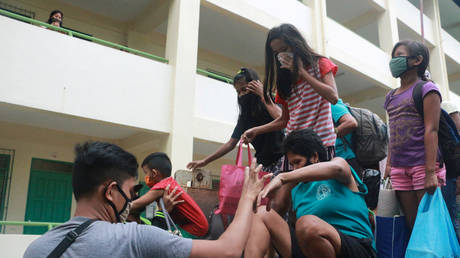
Authorities in the Philippines began the risky but necessary process of evacuating tens of thousands of people as Typhoon Vongfong bore down on the island nation, which is already grappling with the coronavirus pandemic.
Amid widespread fears of flooding and landslides courtesy of the first typhoon of 2020, civil protection authorities helped move over 200,000 from their homes in coastal and mountainous areas as the typhoon lashed the east coast of the Philippines with winds of 155kph (96mph) and gusts of up to 190kph (120mph).
Social distancing measures, imposed on account of the global pandemic, will prove extremely difficult to maintain as thousands of people are packed into evacuation centers to shelter from the storm. Centers will reportedly only accept 50 percent of their capacity and all evacuees must wear face masks, adding yet more pressure to an already tense situation.
Disaster relief agencies and officials have asked the Department of Education to provide more schools which can be used as temporary emergency accommodation as the population battens down the hatches.
Authorities have also asked 47 large churches to open their doors to people fleeing the storm. “We will be overwhelmed so we’re expanding our evacuation to include churches,” said Cedric Daep, disaster chief in central Albay province.
Though the Philippines is struck by an average of 20 typhoons a year, each one brings with it a new challenge and, in this case, one that is exacerbated by a public health crisis.
The country currently has over 11,000 cases of coronavirus infection, mostly in the capital Manila, with a death toll of over 700. However, given the limited coronavirus testing thus far, the total number of infected is expected to rise.
Tens of millions more live in the area expected to bear the brunt of the storm, including near the capital Manila, which may further complicate matters and push emergency services to breaking point.
Typhoon Kammuri, which hit in December 2019, damaged or destroyed some 484,000 houses and forced the evacuation of over one million people, according to figures from the social welfare department.
According to research by the Asian Development Bank, these yearly storms can cut between one and three percent off the Philippine economy, depending on how strong they are.
Think your friends would be interested? Share this story!




